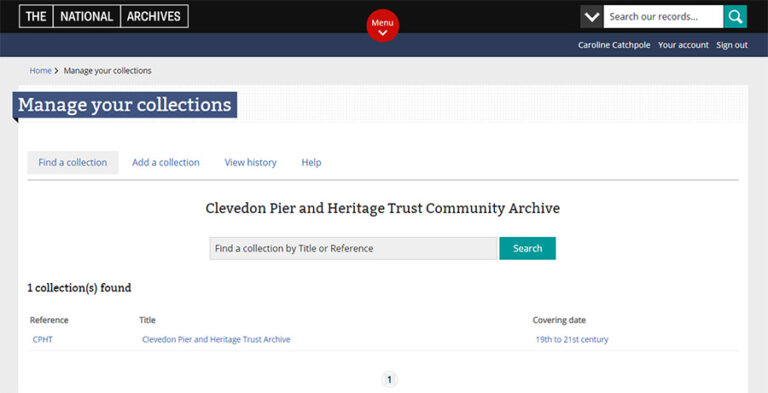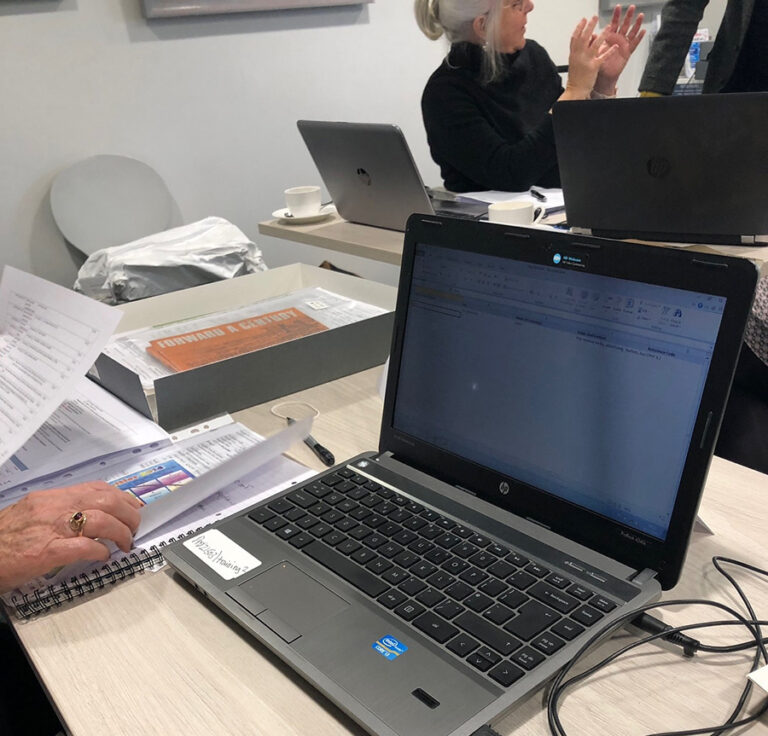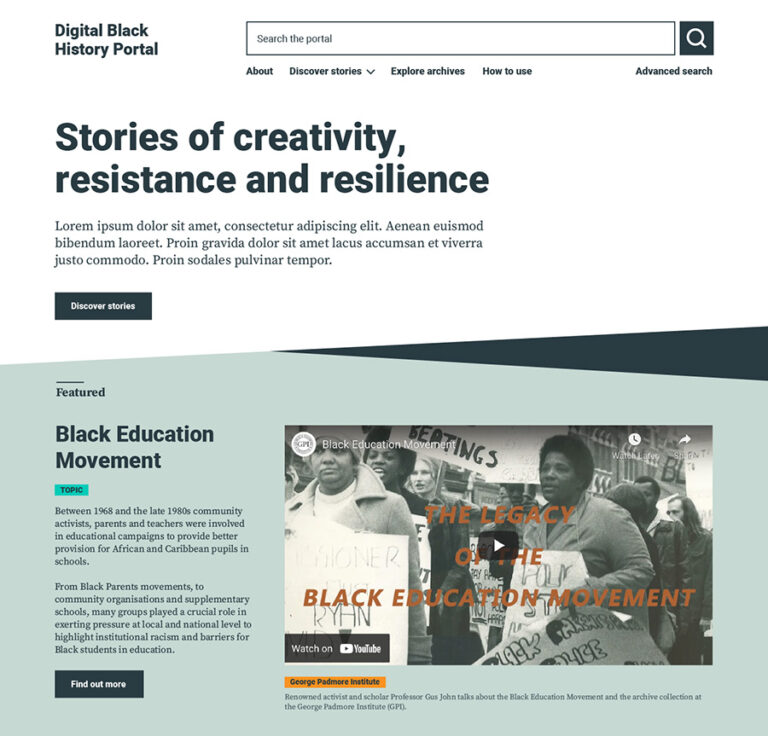Since its launch in 2018, more than 4,000 record descriptions have been added and/or edited in our catalogue, Discovery, using Manage Your Collections (MYC). This blog will take a look back at the past four years and highlight some of the ways different communities have approached using the tool, as well as current initiatives being worked on.
Background
Working towards a national archive network has its beginnings in the 19th century when, in 1869, the Historic Manuscripts Commission (HMC) began to document the location of records and papers in private hands. Their aim, to raise awareness of the collections’ importance within the nation’s archival heritage and history (see footnote 1), is something that continues today, in various forms. From the indexing of collections relating to Creators in the National Register of Archives to the Accessions to Repositories survey that collects annual intelligence data on collections accessioned into archives across the country, we continue the work towards building a national picture of archive collections.
At the turn of the new millennium, a new initiative to expand the national network began. The Access to Archives (A2A) programme aimed to develop a ‘virtual national archival catalogue for the country’ (footnote 2). Complementing the Scottish Archive Network (SCAN), A2A was a component of the English strand of the UK archives network (along with AIM 25 and Archives Hub). The project partners – the British Library, the Public Record Office and HMC – committed to producing ISAD(G)-compliant catalogues based on regional consortia of archives to expand public access to heritage.
The result was a database of catalogues describing archives from various organisations: national and local government, universities and private archives across England. The project actively continued until 2008 and in 2015 when Discovery was launched, the A2A data was added in creating a one-stop shop of catalogues from across the UK. Today, one-third of Discovery’s 36 million records derives from UK archives.
A challenge for the A2A data was maintenance and access once the project had ended. A solution based on giving archives the ability to access their own data began to be developed and, in 2018, Manage Your Collections (MYC) was launched, through collaboration with Archives Sector Development and Digital Services (at The National Archives). A self-publishing tool allowing archives control of their own data on Discovery, MYC offers a free way for archives to connect their collections to a wide user base and directly addresses the challenge of accessing and updating legacy A2A catalogues.
An account-based system that gives archives access to all of their catalogues on Discovery, MYC includes an ISAD(G)-compliant Excel template if archives do not yet have their collections catalogued or a means with which to catalogue them and two ways of uploading data: via the Excel template or by using the metadata mapper to upload exports from their own cataloguing systems. There are also two ways of editing their own content in Discovery, including a live in-browser edit function for correcting quick mistakes or a download and re-upload option for adding more content to a collection, particularly useful if item-level cataloguing is undertaken as new content can be added incrementally.

Beyond the statistics
Since its launch, we have seen over 4,000 collections uploaded and/or updated using the service by 300 UK archives who have active accounts.
When the world shut down in March 2020 and archives closed their doors to the public for a time, cataloguing and enabling online access to collections was a meaningful task that could be carried on. From March to May 2020 we saw a year-on-year increase of catalogues published to Discovery of 422%.
MYC, however, is more than statistics; what lies behind those numbers are the communities that have used it. For some archives, publishing their catalogue data to Discovery is a secondary means of access after their own online catalogue. They utilise the reach of Discovery to promote wider access to their collections to audiences who may not have previously been aware of them.
For others, however, MYC is their only means of providing online access to their collections. Many archives still don’t have the necessary resource and/or budget to maintain a collection management system and online catalogue. Creating equitable access to collections, whatever the means of the parent institution, is one of the great strengths of Manage Your Collections. To complement access to the service, we developed training workshops and webinars that we offer to any archive, community or region interested in learning more. From general ‘how-to’ demos to more targeted training focused on cataloguing and publishing collections, we’ve reached more than 450 people so far. More targeted approaches have been developed too, with the introduction of guerrilla cataloguing days.
We developed guerrilla cataloguing to be a focused burst of cataloguing activity, designed to produce the maximum amount of catalogue information within a short time frame by recruiting as many cataloguers as possible. The aim is to use available digital tools to boost the visibility of selected online collections at low-to-no cost. In 2018 and 2019 we worked with the Clevedon Pier and Heritage Trust and Richmond Local Studies Library on cataloguing two collections. Although the pandemic took this option off the table for a time, it’s our hope we can use this method again in the future to enable resourced-constrained archives the opportunity to enable online access to their records.

Creating a free and easy to use tool has had the added benefit of enabling Discovery to develop as a diverse representation of voices, building a rich picture of British history. Since its launch we have seen collections such as the papers of LGBT+ campaigner Hugh Fell, the records of the charity Islamic Relief Worldwide and trade union-related collections held by the Working Class Movement Library added to Discovery.
Developing targeted training resources
MYC is a standards compliant tool and requires data to be uploaded that adheres to the international best-practice cataloguing standard ISAD(G). It also requires data to be entered into an Excel spreadsheet. Both of these factors can be barriers for smaller, community-based archives who are often managed by people (or in some cases a person) who do not have backgrounds in managing archives or familiarity with using spreadsheets.
To meet this training need to ensure those community archives who want to use the tool have the necessary information and confidence to use the MYC template and create a hierarchical catalogue of their collection, we have developed some training resources. Our webpage, Cataloguing archive collections, details the ‘how’ and ‘why’ of archive cataloguing including what the levels of the hierarchy mean. We have also developed a training workshop that can be delivered in person or remotely that focuses on a Cataloguing 101 session, an introduction to MYC and space for discussion and consultation on individual needs. As each archive is unique, we have also found it hugely beneficial to work one-on-one with community archives, allowing more depth in explaining how to apply the principles of ISAD(G) to their individual collection.
Community archives are a treasure trove of regional history waiting to be explored. They are often replete with detail on regional events, people and businesses and fascinating stories that only the locals would know. We are delighted to have many catalogues from community archives now on Discovery and look forward to welcoming more! If you are interested in browsing these community based collections, then please see:
- Blockley Heritage Society Collection
- Charlestown Community Archive
- Clevedon Pier and Heritage Trust Community Archive
- Crickhowell District Archive Centre
- Evercreech History Society
- Leintwardine History Society
- Milford-On-Sea Historical Record Society Collection
- Spratton Local History Society
- The estate of John Melliar of Sherborne
- The Morrab Library
New opportunities: Digital Black history portal
We continue to explore new ways we can use MYC as a tool to diversify and amplify different voices and experiences through Discovery. In 2021, we began an exploratory research and development project with three project partners: the George Padmore Institute, Black Cultural Archives and the Friends of Huntley Archives at LMA to test and build a prototype to enable archives to utilise Discovery to share stories and create links from and between theirs and other relevant collections.
The project’s first phase has produced a proof-of-concept wireframe prototype for a digital Black history portal. The portal will present records data from Discovery alongside contextual subject information including people, organisations and events (e.g. in the form of digitised images, research guides, blog posts, podcasts and videos) to demonstrate how contextual content can be linked together with archive records to present a richer and more meaningful user experience.
The first phase was successful in demonstrating how diverse and marginalised stories can be pulled together and made accessible to a wider audience. This is work we take into and build on in the next phase, which will focus on developing a small, workable prototype of the portal that can be scaled up over time.

Find out more
Discovery is a treasure trove of collections waiting to be explored. If you’re interested in delving into collections from UK archives, then head to Discovery, enter your search term, filter the search results by ‘other archives’ and see what you find.
If you work in or with an archive and are interested in finding out more about Manage Your Collections, then please do get in touch by emailing us at manageyourcollections@nationalarchives.gov.uk. We’re also happy to hear from anyone that would like support in getting set up with MYC and can offer advice on cataloguing or using the tool.
Footnotes
- Philip Gale and Elizabeth Lomas. ‘The Historical Manuscripts Commission: An Archival Evolution.’ Archives 55: 2 (2020): 15-31
- Caroline Thibeaud. ‘Access to Archives: England’s Contribution to the National Archive Network.’ Ariadne 30 (2001)